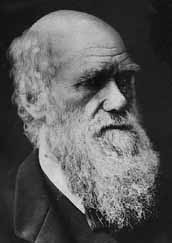


 Email your thoughts
Email your thoughts 
Charles Darwin
|
Darwin's theory convinced us that our lives were the product of a molecular accident in the primordial swamp of the cooling earth |
|
WE tell stories to ourselves; of our journey from birth to death, friends, families, who we are and who we want to be.
Or public stories about history and politics, about our country, our race or our religion. At each moment of our lives these stories place us in space and time. They console us, making our lives meaningful by placing us in something bigger than ourselves. Maybe the story is just that we are in love, that we have to feed the cat or educate the children. Or maybe it is about a lifelong struggle for salvation or liberation. Either way - however large or small the story - the human impulse is to make sense of each moment by referring it to a larger narrative. We need to live in a world not of our making.
Yet, at the end of the 20th century, the act of telling stories about ourselves is difficult for us all, impossible for many. The old narrative forms don't make sense any more. Religion is beleaguered and its literal truth is made ever more improbable by the inroads of science. The family is in danger: people seem to find their identities more by rejecting conventional family ties than by sustaining them. Work has become unpredictable, insecure. Even personal creativity or development is called into question by the overthrow of old aesthetic or moral standards. In 1999 it is hard for anybody's story to get beyond "Once upon a time..." It is even harder to offer loyalty to a world made by anything other than our own selfish solipsism.
What has happened? The short answer is, the 20th century. The slightly longer answer is, the second millennium of the Christian era.
The 20th century has done two things to the human species: it has made us both lonelier and more powerful than ever before. We are lonelier because the insights of science - notably of Newton and Darwin - convinced us, first, that the universe had no need of us, its mechanisms ground on regardless, and, second, that our lives were chance emanations of the global gene pool, which in turn was the product of a molecular accident in the primordial swamp of the cooling earth. Science told us that we were not, as the church had once thought, the point of the cosmic system; we were, rather, a trivial by-product of its logic. We might never have happened and nothing much would have been different.
And yet, at the same time, we became gods. Science, having humbled our imaginations, then gave us unimaginable powers. In the 20th century we toyed with technological Armageddon, wired the planet and began to tinker with the chemistry of life. Anything, good or bad, was possible. We avenged ourselves on the humiliations of the cosmos by taking apart its workings and adapting them to our own ends.
This historically unique combination of loneliness and power is complex, thrilling and potentially lethal. We feel we can do anything, and yet we are confused to the point of imaginative paralysis as to what we should do and why we should do it. There is no guidance, no one theme or cause to which we can all pay homage.
|